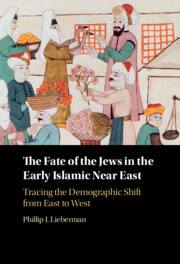
- Publisher:
- Cambridge University Press
- Online publication date:
- June 2022
- Print publication year:
- 2022
- Online ISBN:
- 9781009058018

In this book, Phillip Lieberman revisits one of the foundational narratives of medieval Jewish history—that the rise of Islam led the Jews of Babylonia, the largest Jewish community prior to the rise of Islam, to abandon a livelihood based on agriculture and move into urban crafts and long-distance trade. Here, he presents an alternative account that reveals the complexity of interfaith relations in early Islam. Using Jewish and Islamic chronicles, legal materials, and the rich documentary evidence of the Cairo Geniza, Lieberman demonstrates that Jews initially remained on the rural periphery after the Islamic conquest of Iraq. Gradually, they assimilated to an emerging Islamicate identity as the new religion took shape, sapping towns and villages of their strength. Simultaneously, a small, elite group of merchants and communal leaders migrated westward. Lieberman here explores their formative influence on the Jewish communities of the southern Mediterranean that flourished under Islamic conquest.
‘… a very suitable resource for those interested in Near Eastern studies, archaeology, and Jewish studies … [while] this book focuses on Jews, it can be considered as a very useful source for understanding the Islamic world of the Middle Ages too.’
Maryam Ghasemnejad Source: Immigrants & Minorities
‘… this fascinating monograph rightly challenges scholarly narratives received too uncritically and opens the door to new research questions and possibilities, as is the mark of every worthwhile scholarly book.’
Thomas A. Carlson Source: Speculum: A Journal of Medieval Studies
 Loading metrics...
Loading metrics...
* Views captured on Cambridge Core between #date#. This data will be updated every 24 hours.
Usage data cannot currently be displayed.